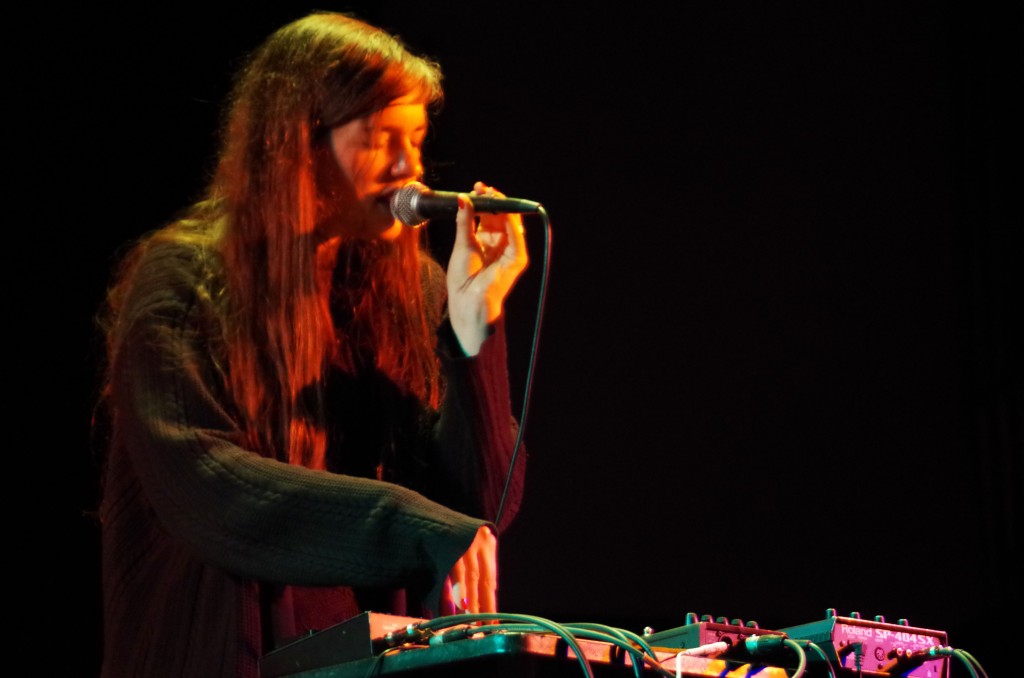By Fabiola Barral
barralfa@grinnell.edu
This Valentine’s Day, soulful performer Julianna Barwick sang at Herrick Chapel. Her songs resonate spirituality, and have a touch of something sacred—very suitable for the chapel setting. Just a brief encounter could touch the most lonely and solemn parts of one’s soul.
Barwick is a Lousiana-born, Brooklyn-based artist. As a child, she spent much of her time in church and in choirs throughout high school. Each element of her background has inspired her work. She also has a degree in photography and enjoys drawing leisurely. In an interview with Interview Magazine, Barwick stated that what she generally looks for in a new song is “uniqueness and a singularity. And just that feeling of, like, ‘Whoa, I’ve never heard anything like this’…I’m a sucker for beautiful vocals—people doing unique things with their voice.”
The uniqueness and singularity that Barwick describes can be seen in the composition of her music. Generally, her tracks begin with a refrain and then utilize a loop pedal to layer her vocals, which are then accompanied with delicate piano chords. Barwick usually records her vocals on her laptop. Her loops and simple recordings add a layer of spontaneity to her work as they are usually recorded immediately. As Time Out New York commented, “many of her songs were written on the fly.”
Barwick’s first album, Sanguine, was released in 2009 and was shortly followed by her EP Florine in 2010. Florine received much acclaim from the press, with Pitchfork giving it an honorable mention for album of the year.
Her second album, The Magic Place, was released in 2011 and was met with equal acclaim. The album was named after her childhood tree. The tree grew in such a way that she could crawl into it as thought it were a home.

The hominess of the title can be seen in the sense of eternal peace in her title song “The Magic Place.” Although the vocals are hardly decipherable, there remains a feeling of being soothed and cared for. One of her other songs off this album, “White Flag,” mixes voices and has a Bulgarian Women’s Gospel sound to it. It’s one of the firmer pieces of the album, despite its title. The song title alludes to a defeat, but Barwick’s intent behind the song was one of surrendering to love. In “Envelope,” listeners can especially catch Barwick’s choir influence emerge. The track is described by Barwick as a hymn, one where a multitude of diverse voices combine to create something larger than anyone’s own individual sound.
Larry Fitzmaurice, a writer for Pitchfork’s press, has described Barwick’s music as “gorgeously tangled compositions.” Several others have accurately described her pieces as elegiac. This mournful quality that critics have noted does not fade alongside with her piano at the end of her tracks. Rather, it continues to stir something inside of its listeners long after the song has finished.
Interestingly, while many of Barwick’s tracks are sorrowful, many, such as “Envelope,” also elicit hope and happiness. Her last track on The Magic Place, “Flown,” also conveys a sense of hope. The track is a commemoration of her sister’s best friend’s death. Despite its sorrowful topic, there is also a message of renewal, and a very deliberate and beautiful way to end her album. World-famous DJ Diplo would agree that Barwick’s sound can vary; he described it as “care bears making love” on his Twitter.
Julianna Barwick’s latest works include two new songs to be officially released March 5. For her new album, Barwick shifts towards using more pianos rather than exclusively using loops of her voice, as can be seen in “Pacing’’ one of her new singles. These two new songs will also be featured in Barwick’s upcoming album Suicide Squeeze. Barwick’s music is an ethereal experience, both soft and haunting, and is a solid and unique addition to this year’s concerts.





























































